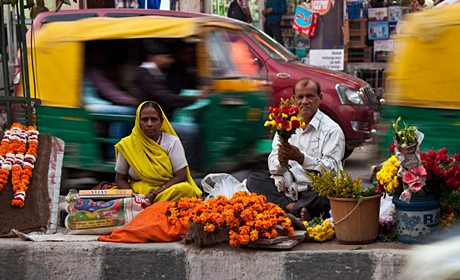UN Women India is building Delhi into a safer city
Date:
Recent tragic events have highlighted how dangerous urban public spaces can be for women. Unfortunately, violence against women is a global pandemic of alarming proportions. Sexual violence against women and girls in public spaces is largely unrecognized and ignored by policies, programmes and budgets.

Urban areas present a unique set of challenges for keeping women safe. Photo credit: UN Women/Gaganjit Singh Chandok
UN Women launched a new flagship initiative: the Safe Cities Free of Violence against Women and Girls Global Programme (‘SafeCitiesprogramme’). The Safe Cities programme is being piloted in five cities around the world, including Delhi. The Safe Cities programme aims to achieve the following long term results:
- A greater sense of safety, reduced fear, and increased comfort of women and girls in public spaces.
- Increased use of public spaces and increased autonomous mobility of women and girls in the city.
- A reduction in different forms of SV in public spaces, especially in the sites of intervention.
Women living in New Delhi experience high levels of insecurity, sexual harassment and violence in buses,on streets as well as in other public spaces. While Delhi has led the way with respect to many urban innovations, it has not been able to successfully address the problem of gender-based violence, especially in its streets, squares,parks and public transport systems. This lack of safety for women, both experienced and perceived, significantly undermine their “Right” to the city – the right to mobility; right to life choices about their place of residence, work, or leisure; and more broadly, to make the best of the opportunities the city has to offer.
To implement the Safe Cities Programme, UN Women is working with key partners including the Department for Women and Child Development, Government of Delhi, JAGORI, Centre for Media Studies (CMS) and Inverted Commas. A large number of stakeholders have already been consulted and more are to be engaged,including the Departments of Education and Transport of the Government of Delhi, the Delhi Police and women’s rights groups.
As part of the programme a survey of over 5000 respondents was conducted across the 9 districts of New Delhi in early 2010. Covering factors that create greater safety and inclusion for women in public spaces around the city, the survey gathered and analyzed information on: (a) nature and forms of gender-based violence and/or harassment faced by women, (b) spots where these incidents happen and that are perceived to be unsafe and inaccessible to women, (c) strategies adopted by women to defend themselves, (d) role of governing agencies and the police in safeguarding women’s rights, and (e) societal perceptions and attitudes to sexual harassment.
In addition, women’s safety audits have been conducted by Jagori in five neighbourhoods in 5 municipal wards (HauzKhas, Malviya Nagar, Mehrauli, Badarpur and Molarband) of New Delhi, with local women and community stakeholders. Through these participatory women’s safety audits, the objective is to explore the elements of public spaces that contribute towards creating safety or vulnerability, and identify possible actions for change and build public awareness, both at the local and policy levels.
During one safety audit, UN Women spoke with citizens on the street. A group of flower vendors were seen sitting in the divider in the middle of the main street. One of the flower vendors is Malati Devi. She was with her husband, Phool Ram. Some of the issues raised by Malati Devi included lack of a safe and permanent space for street vendors, lack of public washrooms for women and lack of drinking water.
Safer cities will benefit all.